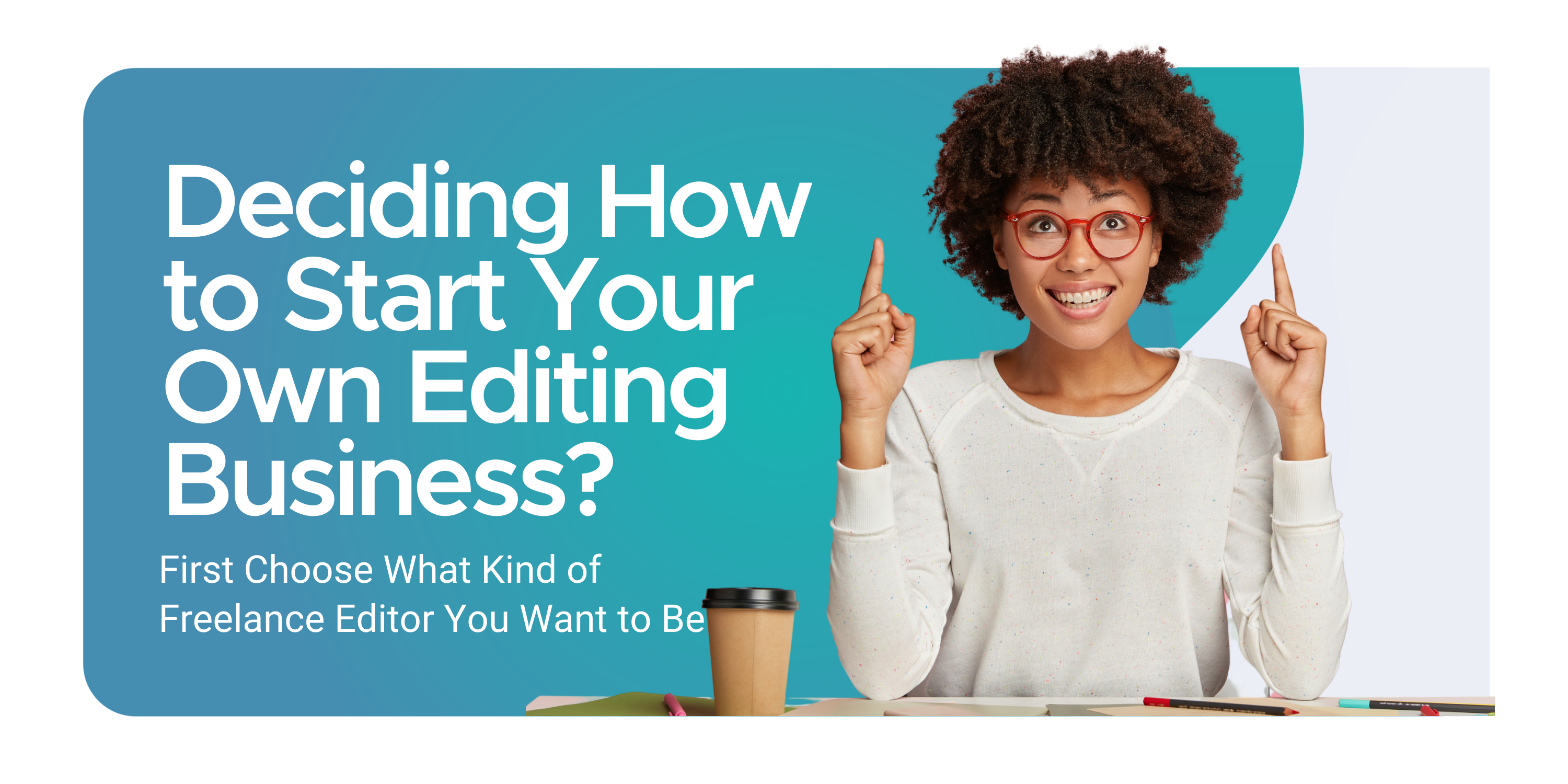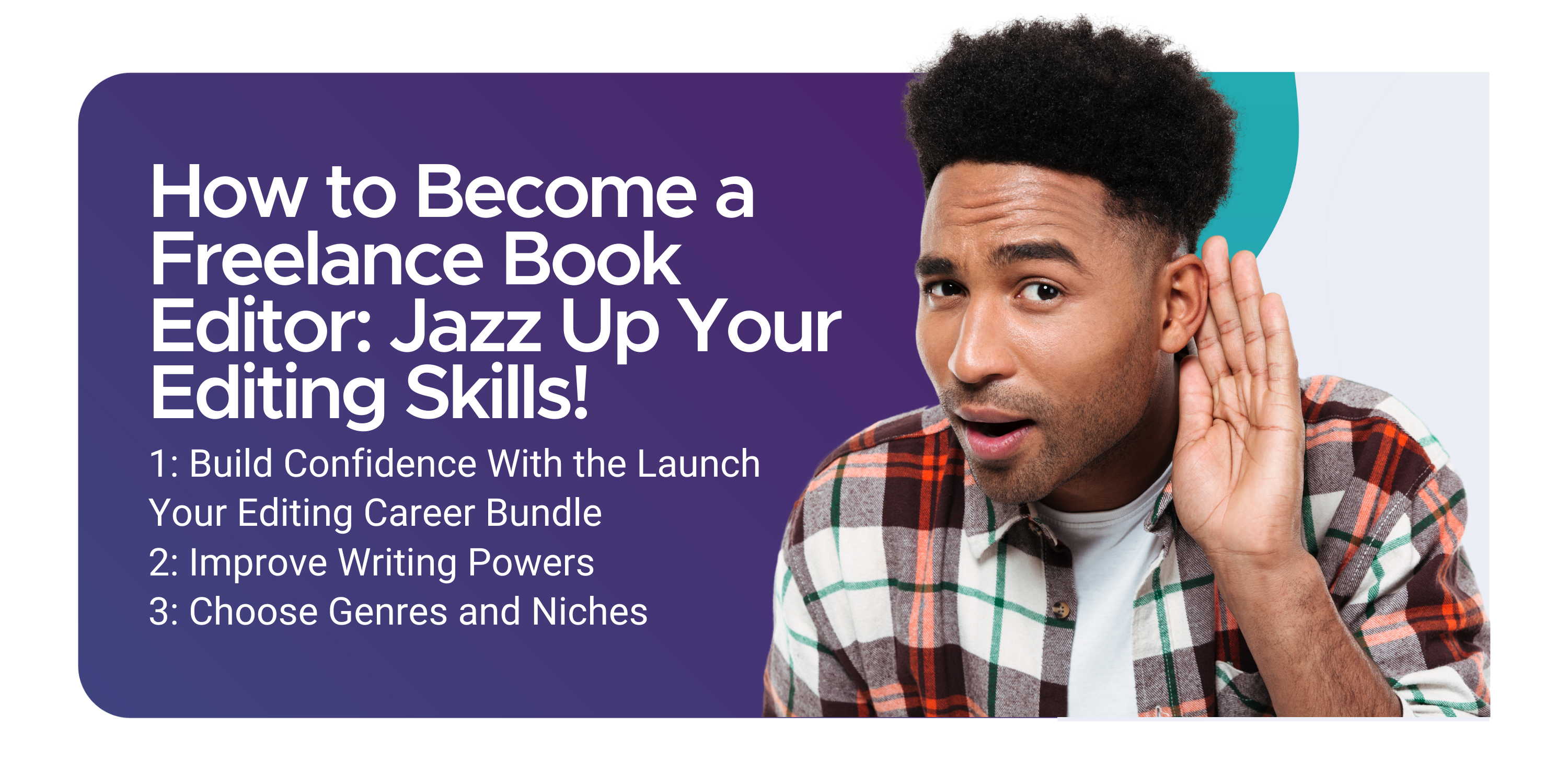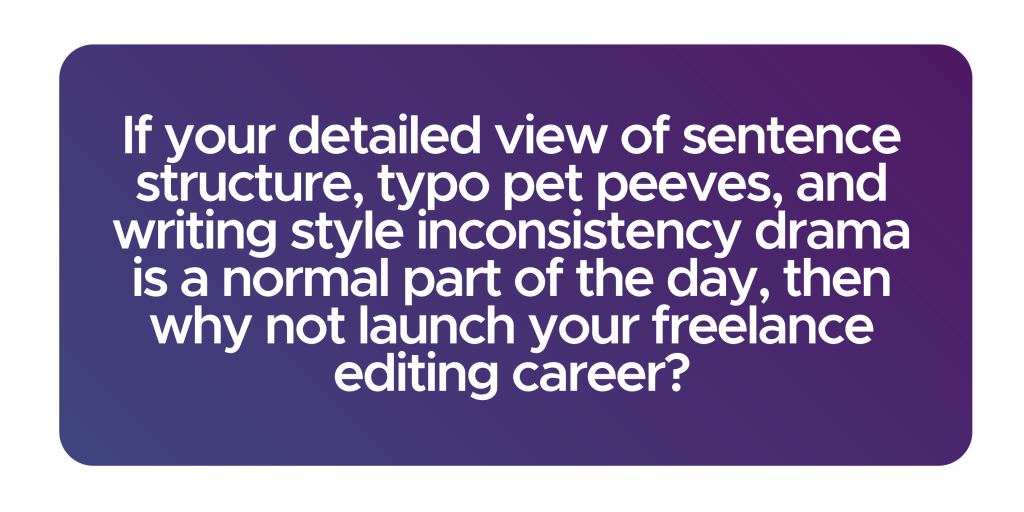So, you love to read and you consider yourself not only a passionate wordsmith, but also an enthusiast for polishing up written content and creating its best version.
If your detailed view of sentence structure, typo pet peeves, and writing style inconsistency drama is a normal part of the day, then why not launch your freelance editing career?
Sharp language and grammar skills, combined with some “secret” business intelligence set you up on a fulfilling career path. If you’ve ever pondered the idea of choosing an editing career, now’s the time to act!
In this article, you’ll learn more about how to start an editing business by focusing on a freelance career path and all the exciting steps it entails.
Curious About How to Start Freelance Editing Business? Keep Reading!
You want to know how to become a freelance editor, but separating fact from fiction can be time-consuming. There are so many unanswered questions about the profession that could make you doubt your capabilities from the get-go, like:
- How do I get noticed among so many freelance editors?
- How do I gain editing skills?
- How do I find editing jobs?
Don’t worry, we have plenty of resources prepared for you to learn how to get into freelance editing, how to set up your business, and how to be a freelance editor who feels strong and confident in their skills and abilities.

Becoming a freelance editor is an exciting career choice, and can be both fulfilling and rewarding if you choose the right type of content, editing process, and client base to work with.
Starting an editing business is so much more than just finding freelance editing jobs. Don’t repeat the mistake of (almost every) beginner freelance editor who accepts all available freelance editing gigs, without putting much thought into what their editing career means to them and whether or not they enjoy their editing work.
You see, finding success with freelance editing first entails deciding what kind of an editor your want to be and then pursuing education and skills in that area. With this in mind, you can choose between becoming:
- A copy editor
- A proofreader
- A developmental editor
- A business editor
- An academic editor
- A niche editor or a generalist
Deciding what type of editing business you wish to run also means specifying what types of editing jobs you wish to do, leaving you to distinguish between:
Developmental Editing
Being a developmental editing wizard means having strong structural, organizational, and big-picture editing skills.
With these strong foundations, you can get more creative with your fiction writers and boost the quality of your nonfiction book editing by addressing the plot, story structure, character arcs, dialogue, and other issues that stain the reputation of otherwise great books.
Line Editing or Stylistic Editing
If you enjoy improving a manuscript’s tone and style, then you will enjoy line editing jobs more than anything else. Alongside fixing issues with flow, you’ll also correct inaccuracies, improve word choice and phrasing, and tailor the writing for precision.
Copy Editing
Aside from sentence structure and phrasing choices, copy editing extends to fact-checking document claims and sources and looking into the overall quality of your editing projects.
A copy editor makes sure to pull together all of the important threads so that the content sparkles and shines from all angles.
Proofreading
Do you enjoy correcting typos in news articles, blogs, business documents, and books? If so, you can specialize in proofreading.
Proofreading entails correcting grammatical errors, polishing up spelling and punctuation, and ensuring that these elements as well as the formatting, images, or graphs are consistent across the document.
Freelance Editing FAQ
What Is a Freelance Editor?
A freelance editor is a professional editor who works independent from any larger organization or a company.
Freelance editors are individuals with strong English language and grammar skills who specialize in making grammatical, syntactical, and stylistic corrections in written content.
What Does a Freelance Editor Do?
Freelance editors offer their own editing services. They bring in clients to their business on their own, and they charge for their work either hourly or on a project-by-project basis.
Most freelance editors are members of editing societies (e.g. Editorial Freelancers Association), where they exchange information, discuss ongoing industry trends, and stay up-to-date with changes in technology.
A good editor attends editing conferences to become more efficient and better at their job, and works constantly to bring in new clients.
In pursuit of clients for their business, most experienced editors use personal platforms, job boards, directories, and even social media.
Starting Your Copy Editing Business? Avoid These Mistakes
If you have the skills needed for various forms of editing, and you enjoy the process of doing freelance work, then you should definitely opt to become a freelance editor. Before you quit your day job, make sure you have covered all of the bases for your editing jobs to run successfully and avoid making common mistakes of our fellow editors who’ve learned the \ hard way.
At The Urban Writers Academy, we frequently hear tales of freelance editor and writer career hurdles that come from making a sudden career jump. We instead recommend pivoting slowly into freelance editing work while maintaining your regular 9-5, or switching to a part-time job that can provide you with regular wages while you’re building a client base.
With this in mind, there are typical roadblocks that an aspiring freelance editor should avoid if they wish to run sustainable editing services:
Going Full-Time Too Soon
Your full-time job may not be as satisfying as you’d hope it would be, but it is providing a stable life. Rushing into a freelance business before you’ve established a secure inflow of jobs may create financial instability, which will cause you stress and could reflect poorly in the quality of your freelance projects.
If you work under distress, this will negatively affect your performance, and could further complicate the career that you’re so passionate about.
Neglecting Writing Skills
You’ll have a hard time correcting others’ work if you don’t have strong writing skills yourself. In that sense, use the opportunity to work closely with freelance writers to deepen your knowledge and writing skill.
Not Understanding Industry Hierarchy and Standards
Freelance editors who rush into the business thinking that their work is all about making grammar and style corrections soon find themselves overwhelmed by the number of positions and titles that exist within the trade.
Your qualifications, performance, and editing experience before freelancing may help you score better clients or even work with publishers (e.g. book editing jobs with a publisher, magazine, newspaper, etc.). Some of these positions include:
- Executive editor
- Senior editor
- Managing editor
These titles are important even if you do freelance work exclusively, as they could affect your pay rates and the scope of projects that you’re equipped to do.
Aside from the trade hierarchy, other standards apply to your potential clients, like:
Style Guide Selection
Style guides affect content structure, style, tone, word choice, citation and reference styles, and much more. If you wish to work with a broad scope of clients, it’s necessary to know the most popular style guides and be able to augment other people’s writing using the standards that they request.
Word Count (Business Volume)
Many aspiring freelance editors make the huge mistake of charging pennies for small editing jobs. This strategy doesn’t pay off in the long run, as the prep work and research takes almost the same amount of time for larger and smaller projects.
Instead, you should break down your services to charge for everything that goes into the work, from the time spent vetting the client, to learning about their business, and ultimately editing.
Using this approach, most editors manage to turn occasional clients into steady ones. Simply put, it’s more convenient for the client to pay you better rates that are more affordable for them in the long run. Once you’ve vetted the client and gotten used to their needs, you can adjust rates so that both of you are winning.
The list of misconceptions about editing work doesn’t end here. If you wish to learn more, sign up for Launch Your Editing Career course bundle and learn all the tricks of the trade!

Choosing to become an exclusive book editor is another important decision when you start an editing business.
Books are a trade category that are appealing to many aspiring editors. Book editing projects include many of the same duties that other editors undertake and can take many shapes depending on the work that your potential clients need.
If you were wondering how to get started as a freelance editor who specializes in books, your journey could look a little bit different compared to what other editors are doing.
With that in mind, learning how to be a freelance book editor will involve the following steps:
1: Build Confidence With the Launch Your Editing Career Bundle
The first on the list of tasks if you wish to become a book editor is to earn qualifications for the job. Most authors expect their editor to have a degree in English language, but they will put their trust in your services if you can show a reputable certificate or have valuable and proven experience.
2: Improve Writing Powers
Writing abilities are essential if you want to work as a developmental or structural editor, both of which are very popular among authors. Writers rely on their editors to make their book its best version, fill in the gaps, reveal plot holes, and even revise entire sections and chapters if needed.
Working on books is a creative, fulfilling job that you’ll only be able to do with decent writing ability.
3: Choose Genres and Niches
Most editors have a list of niches and genres that they work within. After all, you won’t use the same tone, style, and vocabulary for a finance book as you would for a romance novel. It’s necessary to have good insight into your own literary taste when deciding which projects are the best for you.
While you can branch out and step out of your comfort zone, be sure you are able to handle the workload and added difficulties. Only take on what you can handle without compromising in quality—your clients will appreciate a straightforward no more than a yes followed by sub-par work.
These are the crucial steps on the journey to building your editing career that can change depending on the types of documents you work on. Yet, choosing to exclusively edit books or manuscripts doesn’t mean that you have to give up improving other forms of written word.
As you continue your journey of answering: “How do I become a freelance editor?” you’ll discover that some types of projects work better for you than others, and there doesn’t have to be any rule or explanation for it.
Many proofreaders and copy editors choose to branch out into different niches and industries in order to diversify their portfolios and experience—you could easily do the same with the right skill set and experience.
Following your instincts when choosing work is always wise in creative industries, particularly when working with someone else’s writing. Editing is rarely an isolated job, and you’ll likely work closely with writers and other members of their team, so being passionate about your work increases your chance of success.
Working with a team of creatives can prove quite a challenge. However, through our Launch Your Editing Career, you will learn how to not only master your skills, but also how to manage clients.
Freelance Editor Meaning Revealed

Decide to become a freelance editor today, and start working for your own clients on your own terms. Our Launch Your Editing Career Bundle gives you all the skills needed to be successful at an editing job:
- Learn to proofread and edit to become a better editor no matter which project your choose
- Master word processing systems and discover the ins and outs of the editing process
- Learn to run your freelance business from A to Z, including:
- setting up a professional work space
- finding amazing clients
- charging for your work fairly based on project complexity and size
- And much more!
Join The Urban Writers Academy and start your course in proofreading and editing today! Gain in-depth knowledge to become a freelance editor, hone your skills, and launch your business.


